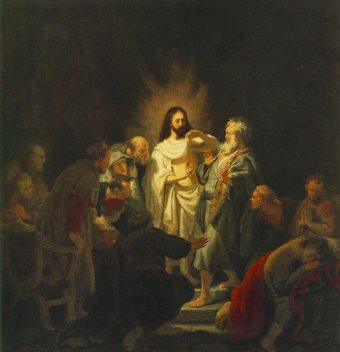COMPELLING TRUTH
The Best Christians Are Thinking Christians, Not Doubting Christians
By Robin Schumacher


One page/printer friendly

The title of Dr. Paul de Vries' recent article — "The Best Christians are Doubting Christians" (Part 1 and Part 2) — initially struck me like lemon juice in the eye. Judging by the comments the article generated, I wasn't alone in my first impression of the writing.
Having read the article a couple of times now, I understand what Dr. de Vries is trying to say and fully appreciate the message he's attempting to convey. While I don't want to come across as some pedantic, uptight guy who's ready to make mountains out of molehills, there are times when terms do indeed matter. The point I'd like to make is this:
Doubt is not something valued in the Bible.
Now, I don't want to put words in Dr. de Vries mouth, but what I think he was trying to say is that the best Christians are thinking Christians vs. doubting Christians. On that point I couldn't agree more and would argue that such a thing is what we're commanded to be in Scripture.
Doubt in the Bible
Sometimes exploring the Hebrew/Greek behind our English translations of God's Word provides a rich window into a deeper meaning of the term than our own language can provide. However, not in this case:Distazō — 1. to have doubts concerning something, doubt, waver 2. to be uncertain about taking a particular course of action, hesitate in doubt. [1]
The word 'doubt', when found in the Bible, means exactly what you'd expect.
While Dr. de Vries says in his article, "I know of no Biblical passage where we are even warned against doubt," I would instead argue that 'doubt' is never used favorably in its context within Scripture (especially Romans 14:23, which explicitly links doubt and sin together):
"Immediately Jesus stretched out His hand and took hold of him, and said to him, 'You of little faith, why did you doubt?'" (Matthew 14:31).
"And Jesus answered and said to them, 'Truly I say to you, if you have faith and do not doubt, you will not only do what was done to the fig tree, but even if you say to this mountain, "Be taken up and cast into the sea," it will happen'" (Matthew 21:21; Mark 11:23).
"When they saw Him, they worshiped Him; but some were doubtful" (Matthew 28:17).
"And He said to them, 'Why are you troubled, and why do doubts arise in your hearts?'" (Luke 24:38).
"But he who doubts is condemned if he eats, because his eating is not from faith; and whatever is not from faith is sin" (Romans 14:23).
"But he must ask in faith without any doubting, for the one who doubts is like the surf of the sea, driven and tossed by the wind" (James 1:6).
"And have mercy on some, who are doubting" (Jude 22).
Dr. de Vries may try to label such verses as exhibitions of "unbelief" vs. doubt, but there's no getting around the term used, with the above verses in their context conveying a sense of uncertainty, a wavering, and the like in a negative sense.
In other words, doubt isn't a good thing.
Thinking vs. Doubting
Now as I mentioned upfront, I believe that the idea Dr. de Vries is aiming at is that thinking about spiritual matters is a very important thing, and in that regard, he is spot on. But there is a difference in careful and mindful scrutiny of truth claims and doubt.In his book, Hard Questions, Real Answers, Dr. William Lane Craig makes this distinction between doubt and thoughtful examination of belief:
When I was an undergraduate at Wheaton College, an attitude was prevalent among the students that doubt was actually a virtue and that a Christian who did not doubt his faith was somehow intellectually deficient or na´ve. But such an attitude is unbiblical and confused. It is unbiblical to think of doubt as a virtue; to the contrary, doubt is always portrayed in the Scriptures as something detrimental to spiritual life. Doubt never builds up; it always destroys. How could the students I knew at Wheaton College have got things so totally reversed? It is probably because they had confused thinking about their faith with doubting their faith. We need to keep the distinction clear." [2]I agree.

Continue to Page 2
1. Arndt, W., Danker, F. W., & Bauer, W. (2000). A Greek-English Lexicon of the New Testament and Other Early Christian Literature (3rd ed., online). Chicago: University of Chicago Press.
2. William Lane Craig, Hard Questions, Real Answers (Wheaton, Il: Crossway, 2003), pg. 33-4. Emphasis in the original.

Image credit: "Doubting Thomas" by Rembrandt, 1634; Public Domain
Tags: Biblical-Truth | Christian-Life | Theological-Beliefs
comments powered by Disqus
Published 2-11-14

